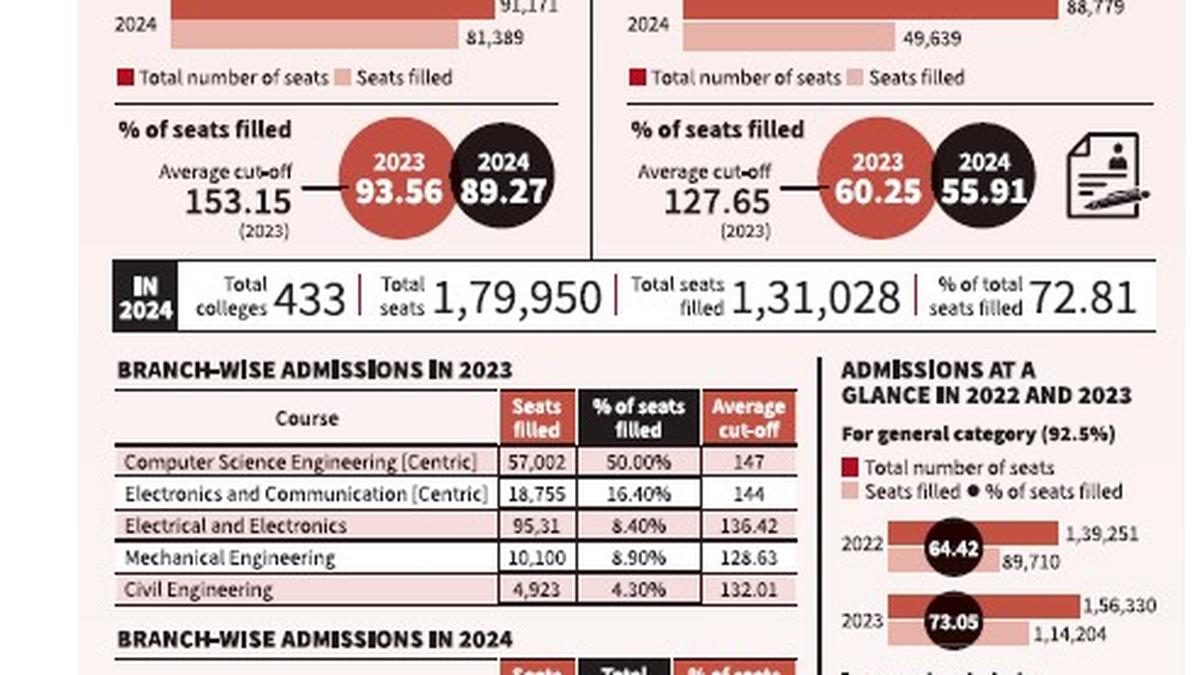
Engineering a bright future
The Hindu
Engineering educators in Tamil Nadu pleased with admission season, filled 72.81% seats, focus on Computer Science Engineering programs.
Engineering educators in Tamil Nadu are pleased with the admission season this year. They consider it a bonanza: engineering colleges affiliated to Anna University have filled 72.81% of the sanctioned seats through the single-window counselling. This year, 23,620 more seats were available than last year.
Data show that students preferred Computer Science Engineering-centric programmes. And, there has been a miniscule increase in the number of seats filled in Mechanical and Civil Engineering.
This year, the All India Council for Technical Education (AICTE), the body that regulates the student strength in colleges, permitted colleges to add seats in certain ‘popular’ disciplines without insisting that seats in subjects such as Civil and Mechanical Engineering must not be surrendered. Last year, that provision was not included.
Officials of the Directorate of Technical Education, who handle the counselling, say that students made their choices with more awareness this year. Independent career guidance expert R. Ashwin also acknowledges it. Just when the Directorate began the counselling, there were allegations that some agents had called up candidates with high cut-off marks in rural areas and urged them to choose institutions that they suggested. Some students had fallen prey to it, admitted R. Velraj, former Vice-Chancellor of Anna University. He advised parents and students, through the media, not to be lured by such elements. “It is best to seek advice from a well-wisher instead,” he said. The Directorate also had candidates with high cut-off seeking its help to reverse their choice of college during the online counselling.
But engineering education observers say it is common knowledge that colleges have agents who persuade candidates to opt for their institutions, even if the candidates have marks that could get them a seat at some of the best institutions. “The details of State board students can be easily accessed as the government collects the data from all schools,” says an educator, adding, “The government must protect the data.”
The admissions happened against the backdrop of allegations that many colleges had cheated in the appointment of faculty members. The founder-chairman of a group of institutions on Chennai outskirts says the AICTE’s decision to permit colleges to add seats without a cap may not help. There are no checks on deemed universities which admit students in thousands, whereas affiliated colleges are answerable to the government, he says. Senior academics, however, say personal attention of senior college administrators has done wonders for their institutions. Mr. Velraj, who had been the deputy director of affiliations in the early 2000s, recalls his experience. Institutions under the direct supervision of the founders thrive because of personal attention, he explains.
In a report he presented to the Syndicate of the university then, he had recorded the reason for the success of private colleges. SSN College of Engineering was a pioneer in many respects, he recalls. It not only appointed faculty with research experience but also paid the faculty handsomely. “SSN was established in 1996. In 2004, the eight-year-old college had 50 faculty members with Ph.D. At that time, there were 40-42 other engineering colleges in the city, excluding Anna University’s four departments. Together all these colleges had around 45 faculty members with Ph.D degrees,” he says, adding: “That is the kind of difference the college made. No other college could match the salary of SSN. The primary requirement of having good teachers helped. The initial faculty members they brought in were very good.”













